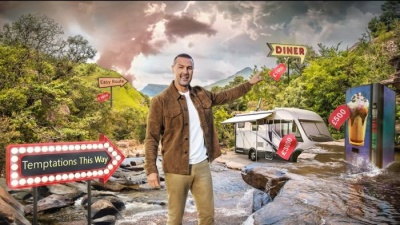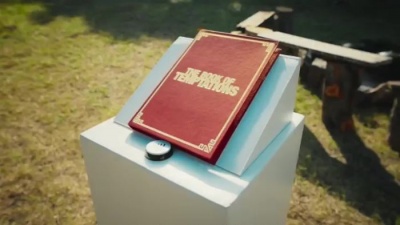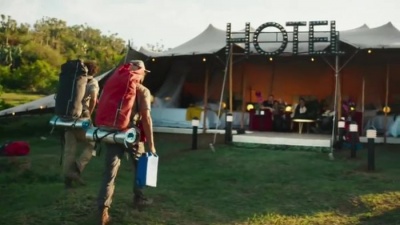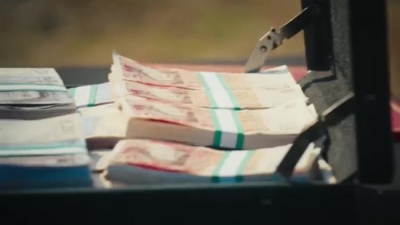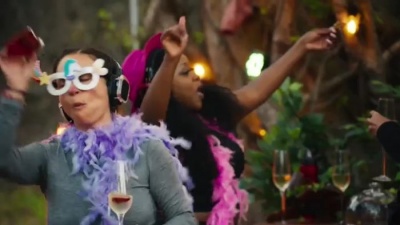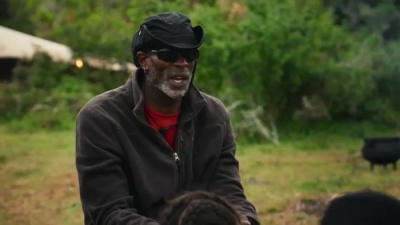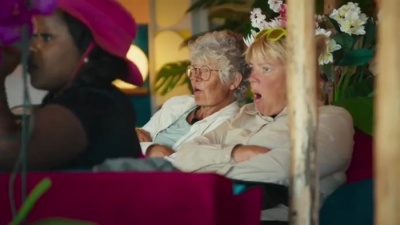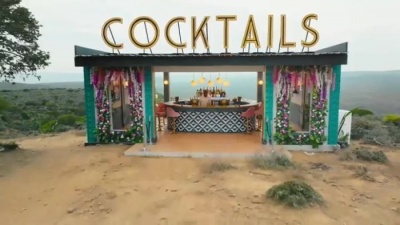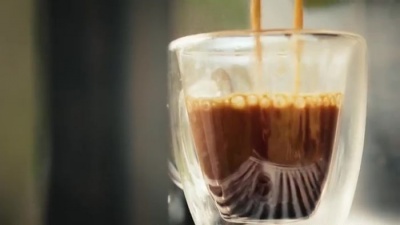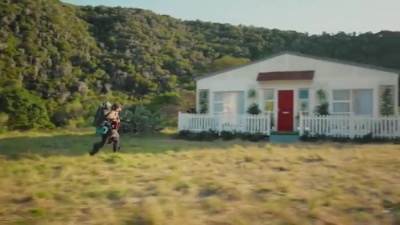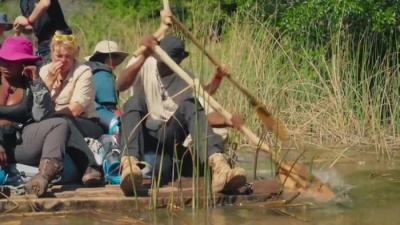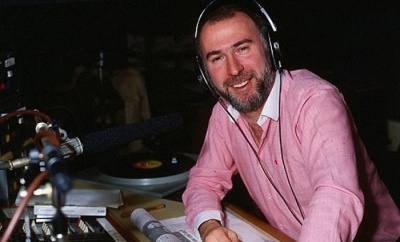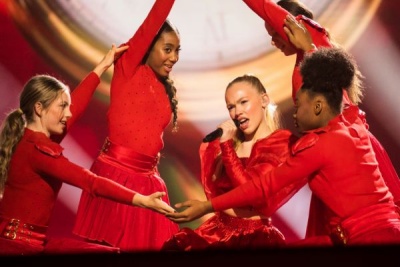Weaver's Week 2023-04-16
Last week | Weaver's Week Index | Next week
Channel 4 seems to have a Thing about "social experiments" right now. This week, we review Tempting Fortune, because we've watched it and want to purge the programme from our system entirely. Next week, we review Rise and Fall, because it's actually turned out to be a halfway decent soap opera (if not a very good game).
This column won't be reviewing Scared of the Dark, where some faded celebrities are left in a darkened room for a week. Why are we not reviewing it? We write a mixed column, and there are just too many social experiments on Channel 4 right now. We want to write about In With a Shout, and Ireland's Smartest, and other new thrills.
Contents |
Tempting Fortune
Voltage TV (part of BBC Studios) for Channel 4, 26 March – 10 April; internationally on Roku
Fair warning: this column didn't connect with Tempting Fortune at all. More than any show in years, it's a show we watched through duty, in the hope that it would improve, with the expectation that it wouldn't.
The basic idea is simple: a group of 12 people is going to take a long trek through the wilderness in South Africa. They will be given enough water, and basic rations that probably won't provide enough energy to complete the trip.
On the course of their journey, the group will be offered "temptations" – little things to make their life easier, or more tolerable. But each of these temptations comes at a ludicrously high price. You thought the minibar in a hotel room was expensive: Tempting Fortune makes it look like Widl. On this show, a single cup of coffee retails for £100 (€ 115), and a night in a double bed costs £3000.
And here's the twist. The cost of these "temptations" is deducted from the group's overall prize fund. That fund starts at £300,000, and anything left at the end of the journey will be split equally between the players. (Or so we were originally told: the fund was actually divided with about two days remaining, and later purchases came from the individual's account.)
Each episode condenses about three days' travel into one Channel 4 hour (so about 43 minutes of real action). Let's face it, six hours of watching people get through the South African wilderness would be dull, so they don't show much of the travelling. The decision points are the "temptations".
The show's tone is set in the opening narration. "If one person gives in to temptation, everyone will pay for it." It's one way to frame the decisions.
According to Paddy McGuinness's opening narration, "We live in a world where we can get what we want the second we want it." No proof was provided for this remarkable statement. McGuinness's script continued, "So, can we put off our immediate desires for the sake of a longer-term goal?"
And that begs the question: what is the goal of this trip? The producers assume that everyone wants money, as much of it as possible. Perhaps the producers are obsessed with money, and cannot think of anyone who might value something else. But there are other, perfectly valid, goals. To prove your physical ability, and complete the hike; if that's your goal, anything to help you along the way will help.
Another valid goal: to go out there and have the time of your life. You're never going to be here again, with these people, walking through the Eastern Cape province. And if that's your aim, then you're going to want to buy as many unforgettable experiences as possible, because it's the trip of a lifetime.
There are other ways to frame the decisions: "we each have a £25,000 share of the prize. We agree to spend it now on things to help us through the trek, on experiences we will never have again. And we'll split anything that's left at the end of the journey." But the producers didn't want us to consider this framing. By concentrating on the money throughout, Tempting Fortune imposed its goal on the group – the love of money.
Allow us to indulge in our occasional sideline of amateur theology. Tempting Fortune evokes a specific religious framework. "Forsake pleasures today, in the hope of more moolah tomorrow. And preach unto thy neighbour, and exhort him away from the path of temptation. For that path leadeth into the Vale of Spendthryft, and the Glade of Gratification, and turning away from the One True Path imposed by Voltage." (Patrick 4:0D)
This is a very Christian concept, most pronounced in the Lutherian-Puritan age of the sixteenth and seventeenth century. Other religious people – pagans, Jews, Buddhists, followers of the Invisible Pink Unicorn – don't value deferred gratification anything like much, and some traditions completely reject it.
On the television programme, this Puritan culture was embodied by James, a big basketball player. James positioned himself as the leader of the group – even though nobody asked him to be leader, and the producers hadn't asked for anyone to be leader. He tried to rule with a rod of iron. "All temptation must be resisted! Think of what you could do with £25,000!" James went on say that he would "be a dick if somebody's gonna be an ass", which helps explain why Tempting Fortune went out after the 9pm watershed.
Inevitably, this unyielding approach created divisions within the group. Although not a single penny was spent on the first day, and just £500 across the next two, more and more contestants chose to dip into the communal pot. Carolynne, a twice-widowed granny, emerged as the most vocal proponent of living for the here and now. She knows that she'll never get another chance to sleep in comfortable bed, in a gazebo, gazing out over the wild plains of South Africa. Sure, it might cost the group £3000 – but that's only £250 each, and all this money is entirely hypothetical until the end of the trip anyway.
We always say that reality shows stand and fall on their casting. Tempting Fortune cast people to fit its prejudices. They wanted some spendthrifts, they wanted some parsimonious people, they wanted self-righteous folk.
The producers got lucky with James, who came across as a fundamentalist preacher in the Jim Bakker mode, and even indulged in a little naughtiness. Mercifully, James nicking a used teabag is nothing like the fraud and sexual abuse that brought down Bakker. But – like the disgraced Bakker – James' acolytes remained loyal to him even after transgressing against the strict moral code he talked about.
But with such large characters around – and a relatively short running time – other people on the trek were marginalised on camera. Many of those who didn't spend much money were effectively background noise, supporting characters in someone else's drama. We never like to get to the final episode and think, "who's that? Who's that? Is she still in?"
For one episode, the group was split into two smaller parts – those who had spent money, and those who hadn't. At once, much of the bickering and argument ceased. Like a car alarm being silenced, like the whines about Russia at the Eurovision Song Contest, the silence was blissful and telling. The spenders' group were able to work for their priorities, to get their reward in the here and now. The non-spenders preferred to wait for the next life, pick up their bigger reward once this journey had ended.
Did Tempting Fortune acknowledge this division in the camp? Just about, but only in the most superficial and desultory manner possible. People put their own point of view, people did whatever they did, and there was no attempt to draw together the various strands of thought.
The show cried out for some analysis of what's going on, in the same way The Family Brain Games combined fun challenges with serious psychology. Could Tempting Fortune have flown a sociologist out to South Africa, and discuss the events with host Paddy McGuinness? They could, and we'd have cheered their audacity even if the idea didn't quite work.
Could they have done a Match of the Day, presented the show from the studio? Have a panel with psychologists, ethicists, and other professional thinking persons? They could have done. Perhaps they should have done. Play in short highlights clips from the trek, give a fair representation of people's reasons, then cut back to the studio where professors and imams and doctors draw out some larger scientific / ethical / observational principles. Tempting Fortune could have been educational, but wasn't. We wonder, was this studio debate rejected because it would expose the crucial gap in the show's framing?
As if to prove that Tempting Fortune was a shallow programme, they got Paddy McGuinness in to host it. There's nothing wrong with Paddy McGuinness in the right place, he's a wonderful presenter on Catchpoint, he's in his element on Top Gear, and he's one of the four best hosts in the long history of A Question of Sport. But Paddy McGuinness doesn't do clever, he doesn't do intellectual, or anything that might ask the viewer to think. Tempting Fortune could have been a nuanced programme, but it wasn't.
Credit where it's due, Tempting Fortune looked awesome. They had the drones and helicopters, and got great closeups in the action challenges. There was a consistent look to the oh-so-expensive treats, landing in the wilderness like they were from outer space. Ian Livingstone's composed music fitted through the programme. All the elements were there for Tempting Fortune to be a memorable show – except one.
Bereft of surprises, almost without any personal growth, Tempting Fortune was a predictable programme, and that made it boring. At the first ad break, 12 minutes in, we had the measure of the show. Puritans versus enjoyables. Cash-obsessed versus the hedonist tendency. The trek wasn't the star of the show, only occasionally did we get a measure of the physical effort the team had to put in. The "temptations" weren't the star of the show, it's difficult to grasp how meaningful experiences are when we only see the reaction. No, the star of the show was the bickering afterwards, usually from the puritan element grouching at someone who had dared spend something.
The camp could had said on day one, "look, we won't leave with all the money. Let's be fair for those interested in money, and try to keep our spending reasonably low. And on the other hand, let's not make others feel guilty for this 'giving in to temptation' stuff: it's the price of keeping them on the trip and not losing huge money from the pot." Someone could have said that, but the producers wouldn't have had much of a show if someone had.
Of all things, we're reminded of Big Brother 4, where the contestants made every effort to avoid fights, stay reasonable, and not be provoked by the producers. And we're reminded of Big Brother 5, where the contestants were pushed and poked and prodded beyond belief until some of them snapped. It's the series everyone remembers and nobody loves. Tempting Fortune chose to be a Big Brother 5. It's a show nobody loves.
Watch more
All episodes on Channel 4, free registration required, .gb only, strong language throughout.
At this time, we don't know when Roku will publish the show.
Pre-transmission: Paddy McGuinness plugs the show on This Morning.
Post-transmission: contestant Lani talks about the experience (with some strong language)
Was all the squabbling worth it? Hardly. The contestants all got about £22,000; those who didn't spend on the final stretch took a couple of grand more.
The participants described this as an "experiment", which implies that there's an idea being tested on this programme. After watching from start to finish, we have no clue what idea is meant to be tested. Other than "twelve people wandering the South African wilderness and spending each other's money makes for bad television if you cast people who don't get along and assume everyone is motivated only by money". We could have told you that for free.
In other news
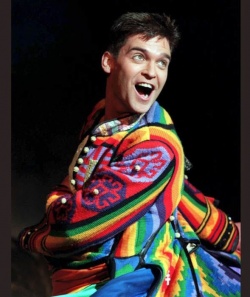 Schofe?! What's he doing here!
Schofe?! What's he doing here!
The Counterpoint final was contested by Anthony Fish, Kathryn Johnson, and Sally Wilson. Yes, they got a bloke into the Counterpoint final, but just the one. After the first round – questions in rotation – Kathryn and Sally had 8 points each, Anthony trailed with just 2. The contestants rejected two of the five offered specialist subjects: "The Apple Record label" and "Idioms and Music" will return in a future series.
Anthony Fish took "Hooray for Hollywood!" It's always tricky choosing last, but Anthony showed tremendous knowledge of the silver screen over the last century, adding ten points to his score. "Make the classical connection" was Kathryn Johnson's round – links between two or more pieces of music, most of them classical, and almost all named by host Paul Gambaccini. It linked her with 11 marks, half-marks awarded in a two-part question. "100 years of Walt Disney" for Sally Wilson; it's far from a Donald Duck round, she scores 12 points.
Sally leads by one point going into the final round, quickfire questions on the buzzer that doesn't buzz. After the lead extends a little, Kathryn levels quickly, only for Sally to pull ahead. Back and forth the lead goes, Sally's ahead, they're level. Kathryn takes the lead on an error from her competitor, but Sally remembers Dave Arch And His Lovely Lovely Band.
The final question: "What was red and yellow and green and brown..."
Sally buzzes, pauses, and doesn't know.
Had she got Joseph's Amazing Technicolor Dreamcoat, we would have had another tie, the second in consecutive annual finals. But Kathryn Johnson emerges victorious, winning by that two points, and taking the coveted Counterpoint silver trophy. Stephen Garner wrote the scripts, with questions by Eliza Battensen, Lilian Crawford, and David Kenrick.
As one music quiz ends, another begins. Popmaster returned in its new home, broadcasting in scratchy mono and sounding like the good* old days of Laser 558 and Atlantic 252. Except without the pacy music, and with Ken Bruce as the staid host – he's no Jessie Brandon or Charlie Wolf.
Little has changed on Popmaster, the rules are as constant as they've been over the past two decades. The questions remain written by a single hand, albeit with a little less emphasis on 21st century music – because the new station doesn't play 21st century music. Is it worth retuning from Woo Gary Davies on Radio 2? This column doesn't think so, why listen to the call-and-lose promotion a-blimmin'-gain, when we could be hearing Rosa Linn's tasty new single.
Popmaster is also coming to television. A six-part series (five heats, one final) is being made by 12 Yard for More4. We expect to see it later in the year.
Nice work, everyone! Date and location for the Junior Eurovision Song Contest have been announced. It'll be at the Palais Nikaïa, on Sunday 26 November. Last year's winners France Télévisions have picked Nice, the swanky resort on the south coast. No word yet on whether the BBC will be back to defend their title as Most Popular With the Public.
CBBC's new shows We do know what goodies CBBC and Cbeebies will have for us. What Freya Did Next is a one-off documentary in the My Life strand, catching up with reigning JESC televote winner Freya Skye. Emma Willis hosts Style it Out, a talent-spotting show for young stylists, emphasising the CBBC values of individuality, creativity, sustainability, and generally being more awesome than anyone dreamed of. Next door on Cbeebies, Get Set Galactic has science challenges for the pre-school crowd, and will be far too confusing for us old fogies.
Bring the drama! Wall to Wall have come up with an acting competition, they're looking for people who can act, but have never had the opportunity to do it professionally. Winner gets a role on a BBC drama and signs with an agent. BBC Arts have commissioned the show, which is expected to air on BBC2, with related programming elsewhere on the schedule.
Quiz Digest
- When he made Tubular Bells, Mike Oldfield was aged nineteen. Nineteen. Nineteen. N-n-n-n-n-nineteen. (Counterpoint)
- Miley Cyrus got the name "Miley" because she smiled a lot when younger. Radio 1 Roadshow had a similar person. (Mastermind)
- Bruce Dickinson of Iron Maiden was shortlisted for the national fencing team. That's fencing as in sword-fighting, we don't know if he's any good at putting up a wooden boundary around your garden.
- Students not recognising a track by old-guard classic rock band R.E.M.? Welcome to 2023. (University Challenge)
- Wicked is now the fourth longest-running musical on Broadway, overtaking Cats for the honour. Ahead of it are The Lion King, Chicago, and The Phantom of the Opera.
- Prior to writing "Bridget Jones' Diary", Helen Fielding was a researcher on The Late Late Breakfast Show (Why Don't Youtube)
Why Don't Youtube also asked Autocompletebot to write a description of Treasure Hunt. The show it's come up with bears a vague similarity to Jamie Theakston's The Search, though needs more poisoned chalices.
Quizzy Mondays
James Beeby and Stuart Field won the two Mastermind matches. James took Eurovision Song Contest winners, and although he trailed Jonathan Evans on specialist knowledge, he did enough on general knowledge to win the night. Stuart had it the other way round – Jason Bourne films his speciality, with contenders George Scratcherd and William Andrews losing on passes and by one point.
Southampton will play UCL in the University Challenge matches. Southampton eliminated Robert Gordon by 180-65, Southampton were confident on their buzzers while Robert Gordon picked up many penalties. Bristol beat UCL by 205-70, another dominant performance with Bristol taking the game early and never letting go. With Durham on the other side of the draw, could the series conclude as it started – Bristol -v- Durham?
This week, Channel 4 gives us Scared of the Dark, an immersive week-long reality experiment. Another one! Can't they spread these out across the year, or something? The Big Interiors Battle (Fri) is also on screen. Family Fortunes returns (ITV, Sun). There are some Celebrity Eggheads episodes (C5, from Thu), and Countdown marks its 8000th daytime episode (C4, Thu). And after just one week, they've dropped In for a Penny with Stephen Mulhern so they can show some men's football. Unbelievable!
Pictures: Voltage TV, Really Useful Group, BBC, EBU/Corinne Cumming
To have Weaver's Week emailed to you on publication day, receive our exclusive TV roundup of the game shows in the week ahead, and chat to other ukgameshows.com readers, sign up to our Google Group.


